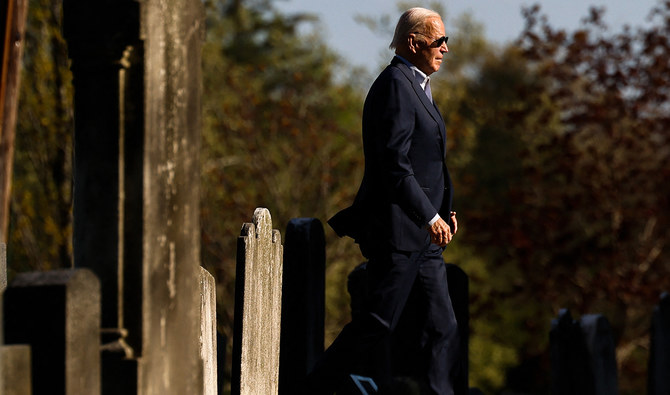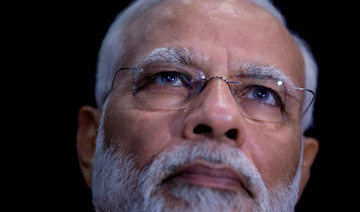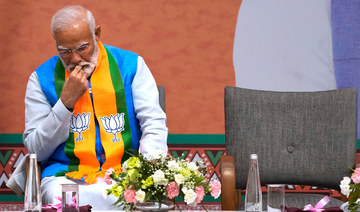WASHINGTON: President Joe Biden can breathe a bit easier, at least for the moment, now that Israel and Iran appear to have stepped back from the brink of tipping the Middle East into all-out war.
Israel’s retaliatory strikes on Iran and Syria caused limited damage. The restrained action came after Biden urged Prime Minister Benjamin Netanyahu’s government to temper its response to Iran’s unprecedented direct attack on Israel last week and avoid an escalation of violence in the region. Iran’s barrage of drones and missiles inflicted little damage and followed a suspected Israeli attack on the Iranian consulate in Damascus this month that killed two generals.
Iran’s public response to the Israeli strikes Friday also was muted, raising hopes that Israel-Iran tensions — long carried out in the shadows with cyberattacks, assassinations and sabotage — will stay at a simmer.
The situation remains a delicate one for Biden as he gears up his reelection effort in the face of headwinds in the Middle East, Russia and the Indo-Pacific. All are testing the proposition he made to voters during his 2020 campaign that a Biden White House would bring a measure of calm and renewed respect for the United States on the world stage.
Foreign policy matters are not typically the top issue for American voters. This November is expected to be no different, with the economy and border security carrying greater resonance.
But public polling suggests that overseas concerns could have more relevance with voters than in any US election since 2006, when voter dissatisfaction over the Iraq War was a major factor in the Republican Party losing 30 House and six Senate seats.
“We see this issue rising in saliency, and at the same time we’re seeing voter appraisals of President Biden’s handling of foreign affairs being quite negative,” said Christopher Borick, director of the Muhlenberg College Institute of Public Opinion. “That combination is not a great one for Biden.”
Biden has staked enormous political capital on his response to the Israel-Hamas war as well as his administration’s backing of Ukraine as it fends off a Russian invasion.
The apparent de-escalation of tensions between Israel and Iran also comes as the House on Saturday approved $95 billion in wartime aid for Ukraine, Israel and Taiwan, a measure that Biden has pushed for as Ukrainian forces run desperately short on arms.
House Speaker Mike Johnson, R-Louisiana, pushed the package forward after months of delay as he faced the threat of ouster by his party’s right flank. The legislation now awaits a vote in the Senate. The new money would provide a surge of weaponry to the front lines, giving the White House renewed hope that Ukraine can right the ship after months of setbacks in the war.
Biden also has made bolstering relations in the Indo-Pacific a central focus of his foreign policy agenda, looking to win allies and build ties as China becomes a more formidable economic and military competitor.
But Republicans, including former President Donald Trump, have an argument to make that Biden’s policies have contributed to the US dealing with myriad global quandaries, said Richard Goldberg, a senior adviser at the Washington think tank Foundation for the Defense of Democracies.
Republicans have criticized Biden’s unsuccessful efforts earlier in his term to revive a nuclear deal with Iran brokered by the Obama administration and abandoned by Trump, saying that would embolden Tehran. The agreement had provided Iran with billions in sanctions relief in exchange for the country agreeing to roll back its nuclear program.
GOP critics have sought to connect Russia’s invasion of Ukraine to Biden’s decision to withdraw from Afghanistan and they blame the Obama administration for not offering a strong enough response to Russian President Vladimir Putin’s 2014 seizure of Crimea.
“You can make an intellectual case, a policy case of how we got from Point A to B to C to D and ended up in a world on fire,” said Goldberg, a national security official in the Trump administration. “People may not care about how we got here, but they do care that we are here.”
Polling suggests Americans’ concerns about foreign policy issues are growing, and there are mixed signs of whether Biden’s pitch as a steady foreign policy hand is resonating with voters.
About 4 in 10 US adults named foreign policy topics in an open-ended question that asked people to share up to five issues for the government to work on in 2024, according to The Associated Press-NORC Center for Public Affairs Research poll published in January. That’s about twice as many as mentioned the topic in an AP- NORC poll conducted in the previous year.
Further, about 47 percent of Americans said they believe Biden has hurt relations with other countries, according to an AP-NORC poll published this month. Similarly, 47 percent said the same about Trump.
Biden was flying high in the first six months of his presidency, with the American electorate largely approving of his performance and giving him high marks for his handling of the economy and the coronavirus pandemic. But the president saw his approval ratings tank in the aftermath of the chaotic withdrawal of US troops from Afghanistan in August 2021 and they never fully recovered.
Now, Biden finds himself dealing with the uncertainty of two wars. Both could shadow him right up to Election Day.
With the Israel-Hamas war, Republicans pillory him as not being adequately supportive of Israel, and the left wing of his party harshly criticizes the president, who has shown displeasure with Netanyahu’s prosecution of the war, for not doing more to force the Israelis to safeguard Palestinian lives.
After Israel’s carefully calibrated strikes on Iran, Middle East tensions have entered a “gray area” that all parties must navigate carefully, said Aaron David Miller, an adviser on Middle East issues in Republican and Democratic administrations.
“Does what has occurred over the last 10 days strengthen each sides’ risk-readiness or has it made them drop back from the brink and revert into risk aversion?” Miller said. “Israel and Iran got away with striking each other’s territory without a major escalation. What conclusions do they draw from that? Is the conclusion that we might be able to do this again? Or is it we really dodged a bullet here and we have to be exceedingly careful.”
Israel and Hamas appear far away from an agreement on a temporary ceasefire that would facilitate the release of remaining hostages in Hamas-controlled Gaza and help get aid into the territory. It’s an agreement that Biden sees as essential to finding an endgame to the war.
CIA Director William Burns expressed disappointment this past week that Hamas has not yet accepted a proposal that Egyptian and Qatari negotiators had presented this month. He blamed the group for “standing in the way of innocent civilians in Gaza getting humanitarian relief that they so desperately need.”
At the same time, the Biden administration has tried to demonstrate it is holding Israel accountable, imposing new penalties Friday on two entities accused of fundraising for extremist Israel settlers that were already under sanctions, as well as the founder of an organization whose members regularly assault Palestinians.
National security adviser Jake Sullivan and other administration officials met on Thursday with Israel’s minister for strategic affairs, Ron Dermer, and national security adviser Tzachi Hanegbi. US officials, according to the White House, reiterated Biden’s concerns about Israel’s plans to carry out an operation in the southern Gaza city of Rafah, where some 1.5 million Palestinians have taken shelter.
Ross Baker, professor emeritus of political science at Rutgers University, said Biden may have temporarily benefited from Israeli-Iranian tensions driving attention away from the deprivation in Gaza.
“Sometimes salvation can come in unexpected ways,” Baker said. “But the way ahead has no shortage of complications.”


























